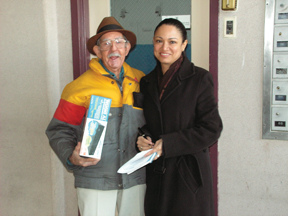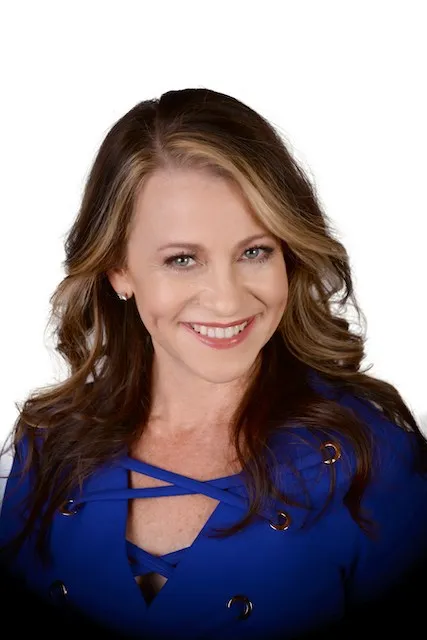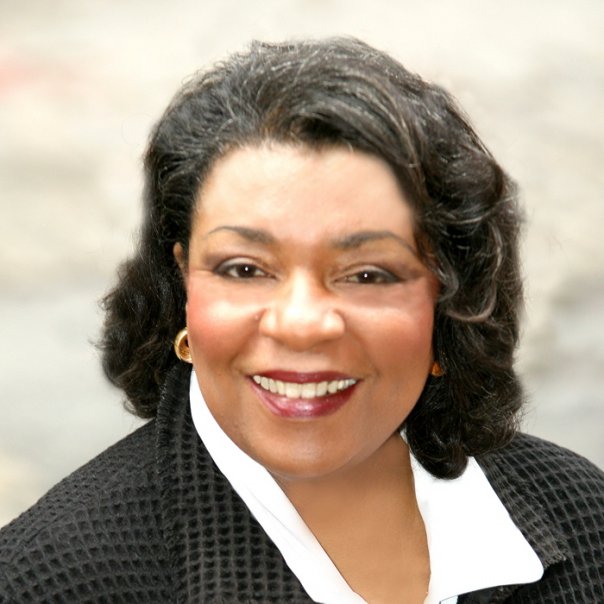 For her project in the Landmark Education Self Expression and Leadership Program, New Jersey resident Rosa Abreu assisted senior citizens in West New York who would be unable to watch their older televisions after a television broadcasting switch to digital cable. Her project, which gave these seniors converter boxes so they could still use their old sets, was featured in the Hudson Reporter of Hudson County, New Jersey. That story appears here in its entirety.
For her project in the Landmark Education Self Expression and Leadership Program, New Jersey resident Rosa Abreu assisted senior citizens in West New York who would be unable to watch their older televisions after a television broadcasting switch to digital cable. Her project, which gave these seniors converter boxes so they could still use their old sets, was featured in the Hudson Reporter of Hudson County, New Jersey. That story appears here in its entirety.
Stay Tuned
Local Woman Donates Converter Boxes to Seniors
by Amanda Staab
West New York seniors will still be able to catch their evening “Jeopardy!” on their old television sets after the digital TV transition takes place this coming February, thanks to the generosity of a former town resident.
Rosa Abreu, a director at the Millennium UN Plaza Hotel in New York City, recently raised $850 to purchase 15 converter boxes for seniors living at the West New York Housing Authority’s FDR Building on 6100 Adams St.
With the help of her boyfriend, Tim Runkel, who works at Goldman Sachs in Jersey City, she made the deliveries last week, as well as some of the installations.
Early next year, a federally mandated change in television broadcasting will mean that old television sets can no longer transmit regular channels unless they are connected to a $40-$50 converter box, or unless the owner has cable or satellite TV. Viewers can go to www.dtv.gov to order government vouchers to get $20 off the boxes.
“She is Santa Claus to me,” said senior Rafael Vallejo, a recipient of a box, last week. He said that now he’ll be able to continue watching all his favorite television programs.
Abreu explained that the converter box giveaway was her final project for a self-awareness class she took at an independent institution.
Abreu said that at first, she thought she would raise funds to create a scholarship for minority students, but then she abruptly changed her mind when she saw a public service announcement explaining the upcoming switch to seniors.
“That commercial just inspired me to say, ‘Hey, you know what? I know seniors who can’t afford to have cable or have an antenna. That is going to be my project,’” she said.
Selling the idea
She said that when she lived in West New York for eight years, she became aware of how many seniors live in the public housing buildings. She chose the location on Adams Street and “went door to door, floor to floor,” asking seniors if they had cable or if she could help them.
“They had questions as to why I was at their door,” said Abreu. She added that they were suspicious of her and even asked if there was a trick to her offer.
“So, I had to sell them on the idea of giving it to them,” she said. “I guess it is because seniors have been victimized so many times that they are afraid of a stranger coming to their door, knocking on their door.”
Nonetheless, she said, she was determined to help them prepare their old TVs for when the signal changes from analog to digital.
“If you don’t have this box to convert the signal, you won’t be able to watch regular television,” said Abreu. “You are out of luck.”
Only contact to outside
Before going door to door, Abreu said she had not realized how homebound some of the seniors are, and that many of them don’t have family close by to take care of them.
“TV is really what they have,” she said. “If they don’t have someone helping them, they’re by themselves. If they can’t watch TV, they don’t have any contact with the outside world whatsoever.”
Abreu added that she also wanted to give back to seniors because in many cases, they are low on funds.
Senior Marta Marrero seconded the notion.
“You made me very happy,” she said to Abreu, “because I don’t have money. I don’t have money now for anything.”
Marrero also said that she has to spend a lot on expensive medications and that there are many other seniors in her same situation. “I am very grateful,” she added. “This is a Christmas gift. I am very happy, so happy.”
Other residents were also delighted with their delivery.
“I need this because my TV doesn’t work,” said senior Jose Garbel. He said that he has not been able to get channels in Spanish, but with the box, he will definitely have a few to watch come February.
Abreu said that she, too, was happy with the outcome.
“It helped me to be more open-minded to other people, not for me to be self-absorbed, to think about others,” she said.
Runkel said that being charitable is simply Abreu’s nature.
“That is who she is,” he said. “She is very helpful. It is just her personality.”
The converter box project was not her first outreach program, Abreu said. Two years ago, she participated in a mission trip to Bolivia to help build a church.



1 comment
Abreu; keep up the good work!